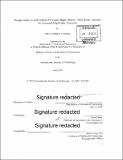Design, analysis, and control of a nitinol shape memory alloy rotary actuator for spacecraft deployable structures
Author(s)
Contreras, Mario Melendrez.
Download1130061232-MIT.pdf (8.936Mb)
Other Contributors
Massachusetts Institute of Technology. Department of Mechanical Engineering.
Advisor
Kerri Cahoy.
Terms of use
Metadata
Show full item recordAbstract
Small satellites known as CubeSats are becoming more and more popular in the aerospace industry and in academia. The new availability of rockets such as SpaceX's Falcon 9 or even dedicated CubeSat rockets such as Rocket Lab's Electron rocket have provided a new opportunity for many organizations to launch satellites. Depending on the goals of each satellite, they can be configured with many different payloads and mechanisms. Solar panels are one of the most common payloads on CubeSats but are mostly spring-actuated, meaning they cannot be deployed to precise angles. Shape memory alloys have been used to create rotary mechanisms in the past but closed loop control of shape memory alloys in a bending architecture is relatively novel. A rotary shape memory alloy actuator was designed with the use case of precisely pointing solar panels to maximize energy collection. Here we show identification of a system transfer function through multiple step responses and the use of a closed-loop PID control to achieve rise times of about 15 seconds with overshoot errors of 2 to 8 degrees. The experiments also showed the possibility of achieving rapid rise times of less than 2 seconds and accuracy within 2 degrees with some slight changes to the control system. This actuator prototype further develops the possibilities of precision angular actuation in a lightweight, robust, low volume, low power, and simple mechanical system.
Description
Thesis: S.B., Massachusetts Institute of Technology, Department of Mechanical Engineering, 2019 Cataloged from PDF version of thesis. Includes bibliographical references (pages 34-35).
Date issued
2019Department
Massachusetts Institute of Technology. Department of Mechanical EngineeringPublisher
Massachusetts Institute of Technology
Keywords
Mechanical Engineering.